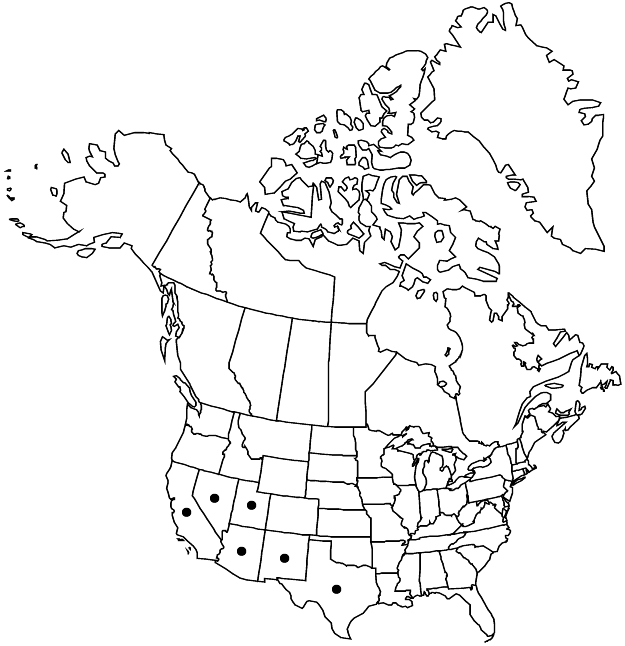Eriogonum wrightii
in A. P. de Candolle and A. L. P. P. de Candolle, Prodr. 14: 15. 1856.
Shrubs, subshrubs, or herbs, rarely scapose, (1–)1.5–10 × 1–15(–18) dm or, if matted, 0.1–2.5(–3) × 0.5–3(–5) dm, , lanate to thinly tomentose, or glabrous, grayish to greenish or reddish. Stems spreading to erect, with or without persistent leaf bases, up to 1/2 or more height of plant; caudex stems absent or spreading, occasionally matted; aerial flowering stems erect to spreading, stout to slender, solid, not fistulose, (0.1–)0.5–4(–6) dm, tomentose, floccose, or glabrous. Leaves basal and fasciculate in terminal tufts, or cauline and fasciculate, occasionally 1 per node; petiole 0.02–0.5(–1) cm, tomentose to floccose; blade oblanceolate to broadly elliptic, 0.1–3 × 0.1–1 cm, tomentose to floccose, sometimes subglabrous or glabrous and green adaxially, margins plane, sometimes revolute. Inflorescences virgate or cymose with involucres disposed at tips racemosely arranged involucres, rarely capitate, (1–)5–20 × (1–)10–40 cm; branches dichotomous, tomentose, floccose, or glabrous; bracts 3, triangular, scalelike, 0.5–3.5 mm. Peduncles absent. Involucres 1 per node, turbinate to narrowly campanulate, (0.7–)1–4 × 1–2.5 mm, tomentose, floccose, or glabrous; teeth 5, erect, 0.3–1 mm. Flowers 1–4 mm; perianth white to pink or rose, glabrous; tepals connate proximal 1/4, monomorphic, obovate; stamens exserted, 1.5–4 mm; filaments glabrous or sparsely pilose proximally. Achenes light brown to brown, (1–)1.5–3 mm, glabrous.
Distribution

w North America, including nw Mexico.
Discussion
Varieties 9 (6 in the flora).
Eriogonum wrightii is subdivided into several varieties most of which are distinct, although a few have rather indistinct boundaries. Some of the variation has yet to be fully resolved, especially in the var. nodosum complex where, at least in Mexico, one additional expression remains to be named. A clear distinction between var. subscaposum and E. kennedyi is not possible in southern California (see discussion below). Nearly all of the varieties of E. wrightii are in cultivation, although the most elegant (var. olanchense) has yet to be so honored.
Few ethnobotanical uses of bastard-sage are reported in the literature. L. C. Wyman and S. K. Harris (1951) noted that the Kayenta Navajo use it (var. wrightii) as an emetic, while M. L. Zigmond (1981) stated that the Kawaiisu used the pounded seeds (probably of var. subscaposum) in a beverage or as a dry meal. Members of the species are food plants for the rare Rita dotted-blue butterfly (Euphilotes rita), the Pacific dotted-blue (E. enoptes), the veined blue (Plebeius neurona), and the Mormon metalmark (Apodemia mormo mormo).
Selected References
None.
Lower Taxa
Key
| 1 | Plants loosely to compactly matted or herbs | > 2 |
| 1 | Plants shrubs or subshrubs | > 3 |
| 2 | Plants 0.5-2.5(-3) dm; leaf blades 0.5-1(-1.2) cm; involucres 1.5-4 mm; e and s California,wc Nevada | Eriogonum wrightii var. subscaposum |
| 2 | Plants 0.1-0.3(-0.6) dm; leaf blades 0.1-0.25 cm; involucres 0.8-1.7(-2) mm; se California | Eriogonum wrightii var. olanchense |
| 3 | Flowering stems and branches grayish, lanate to densely tomentose; sw Arizona, se California | Eriogonum wrightii var. nodosum |
| 3 | Flowering stems and inflorescence branches whitish, reddish, or greenish, tomentose to floccose; widespread | > 4 |
| 4 | Petiole bases forming distinct ring around stem; leaf blades 0.2-0.6(-1) × 0.1-0.3(-0.4) cm; s California | Eriogonum wrightii var. membranaceum |
| 4 | Petiole bases not forming distinct ring around stem; leaf blades 0.5-3 × 0.2-1 cm; sw United States, Mexico | > 5 |
| 5 | Leaf blades 0.5-1.5 × 0.2-0.5(-0.7) cm; involucres 2-2.5 mm; flowers 2.5-3.5 mm; se California to w Texas | Eriogonum wrightii var. wrightii |
| 5 | Leaf blades 1.5-3 × 0.5-1 cm; involucres 3-4 mm; flowers 3-4 mm; c and nw California | Eriogonum wrightii var. trachygonum |